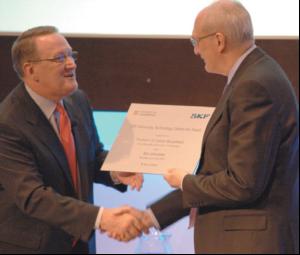

|
Edward Lowton
Editor |


|
| Home> | Plant, Process & Control | >Bearings | >Steeled for success |
ARTICLE
Steeled for success
25 January 2013
The inauguration has taken place of the SKF University Technology Centre for Steels and Heat Treatment at the University of Cambridge. The initial five year contract was signed in 2009 between SKF and Cambridge Univer

The inauguration has taken place of
the SKF University Technology
Centre for Steels and Heat Treatment
at the University of Cambridge.
The initial five year contract was signed in 2009 between SKF and Cambridge University Department of Materials Science and Metallurgy.
SKF identified and selected a number of steel technology R&D topics for the University to work on to achieve a better understanding of: How to manage the detailed microstructure and exploit this knowledge to enhance bearing properties How modifications to steel composition can enable complex operational demands to be mitigated How to predict the performance relative to the steel and heat treatment selection.
Dr Alan Begg, senior vice president group technology development at SKF, says that the rationale behind the creation of the University Technology Centres was to create strategic partnerships with universities targeted on key technical areas and, in so doing, to create critical mass to get attention. A further aim is to establish partnerships with others in order to gain additional funding.
Leading the team at Cambridge is Professor Harry Bhadeshia a world expert in physical metallurgy of steels who welcomes the opportunity to work with SKF, but knows that industry and academia won't always agree on everything.
The initial five year contract was signed in 2009 between SKF and Cambridge University Department of Materials Science and Metallurgy.
SKF identified and selected a number of steel technology R&D topics for the University to work on to achieve a better understanding of: How to manage the detailed microstructure and exploit this knowledge to enhance bearing properties How modifications to steel composition can enable complex operational demands to be mitigated How to predict the performance relative to the steel and heat treatment selection.
Dr Alan Begg, senior vice president group technology development at SKF, says that the rationale behind the creation of the University Technology Centres was to create strategic partnerships with universities targeted on key technical areas and, in so doing, to create critical mass to get attention. A further aim is to establish partnerships with others in order to gain additional funding.
Leading the team at Cambridge is Professor Harry Bhadeshia a world expert in physical metallurgy of steels who welcomes the opportunity to work with SKF, but knows that industry and academia won't always agree on everything.
MORE FROM THIS COMPANY
- Condition-based asset care: A three-level approach
- Boosting bolt tightening
- Bearing success
- Spindle service
- Bearing solutions
- Food industry compliant bearings
- High load linear module
- Condition monitoring service expanded
- Remote monitor for automatic lubrication systems
- Efficient lubrication strategy?
OTHER ARTICLES IN THIS SECTION

















